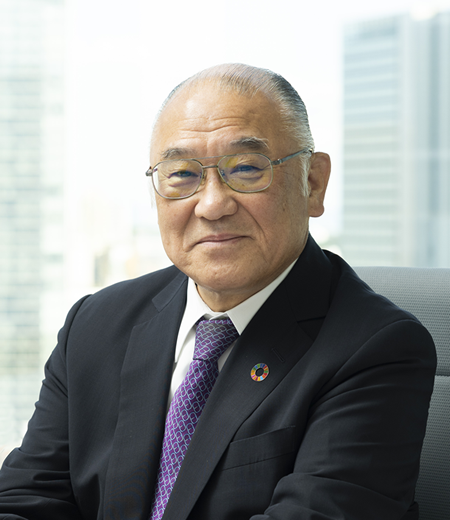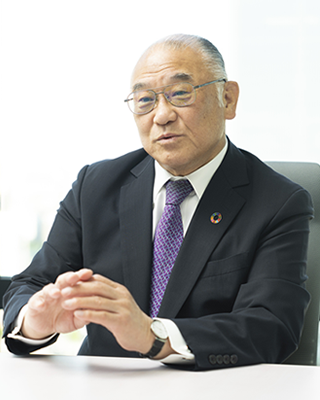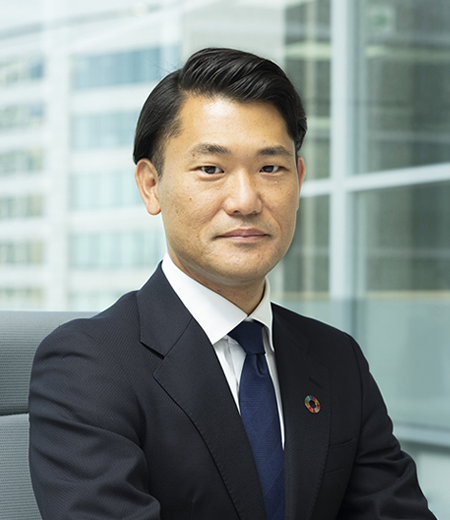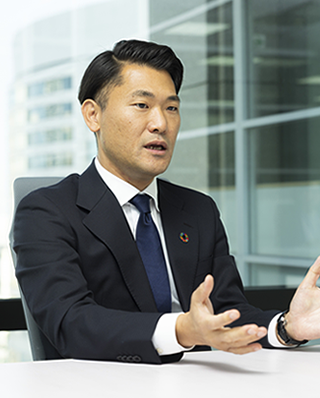
We will steadfastly embody the spirit of
“仕濾過事” (Rokajinitsukafuru)
and aim to realize a sustainable society
Atsuhiko Yamazaki
Representative Director and President
New Filter Media Paving the Way for New Markets and Minimizing Environmental Impact
Since our founding in 1956, we have vigorously advanced our business activities with a consistent adherence to our corporate philosophy of “仕濾過事” (Rokajinitsukafuru), which means “contribute to society through the filtration business.” The industry-leading technology we have cultivated as a research and development-oriented company is highly regarded both in Japan and overseas.Our core products—filters for construction machinery and air filters—support comfortable living for people around the world.
Our achievements are also reflected in our numbers, with the company recording its highest-ever sales and profits in FY2024. Among these, our service parts that are offered as replacement filters are seeing growing demand, aligning with the aftermarket strategy of construction machinery manufacturers. Underpinning this steady growth are our long-life filters, which were developed with a focus on disposal after use. In FY2024, we also commercialized a new model that uses the YAMASHIN Nano Filter™, our next-generation filter media. The new model features a significantly longer service life—three times as long as conventional products—which contributes to reducing waste volume and CO2 emissions. However, there were concerns about weaker sales during its development phase. Although pursuing profit is natural for any company, we approached development with a strong sense of duty to provide products that benefit society. As a result, this product, which successfully reduces environmental impact and maintenance burden, has been chosen by users and become our flagship product for construction filters. This success story is precisely because we adhered to the spirit of “仕濾過事” (Rokajinitsukafuru). Drawing on the DNA we have inherited over seven decades, we will continue to dedicate ourselves to product development.
Advancing ESG Management for Further Growth

In November 2024, we announced our first three-year Medium-Term Management Plan, effective from FY2025, to serve as a compass for sustaining business growth and enhancing corporate value. Within this plan, we have identified the promotion of ESG management as one of our basic strategies. It is our responsibility to contribute to society through our business activities, and we believe that sustainability initiatives can help drive company growth in the way our long-life products did.
To accelerate our initiatives, we incorporated numerical targets in our non-financial KPIs for the company’s FTSE1 (an ESG investment index) and CDP2 Climate Change scores. Clearly defining—and working toward—numerical targets that serve as key indicators for the company’s performance is meaningful because it ensures that we do not stall growth by overestimating our efforts. Fortunately, we achieved our target CDP score of A in February 2025. This result was due to our development of environmentally conscious products, in addition to holding monthly Yamashin Sustainable Solutions (YSS; see P.10) Committee meetings to formulate strategies and make sustained efforts to improve, such as by adopting renewable energy. To ensure we remain an A List company, we will work to further reduce CO2 emissions, primarily at overseas factories where there is still room for improvement. We significantly improved our FTSE score from 2.7 to 3.8 in July 2025 and aim to achieve our target score of 4.0 ahead of schedule. We will also leverage our biannual Partner Meetings with suppliers to strengthen ESG initiatives across the entire supply chain and proactively disclose progress.
Furthermore, as part of our ESG management initiatives, we are also working to expand our range of high-value-added products that help address social issues. Extending the service life of products is one such initiative. We are challenging ourselves to apply, across various fields, the YAMASHIN Nano Filter™, which uses ultra-high-density fibers to drastically enhance filtration efficiency. The apparel line we recently announced is a prime example of this. By transforming fibers into stretchable fabric, we simultaneously achieve thinness, lightness, and warmth, making it suitable for sportswear and cold-weather gear. Our electromagnetic wave shield, which effectively blocks electromagnetic waves generated inside electric vehicles, has also reached the demonstration phase. Expectations are also high for its application in biosensors that measure heart rate, as well as in medical and nursing care, sports, and other fields. While development involves a series of mundane tasks, we can push the boundaries of existing filtration and work toward an exciting future by collaborating with companies we’ve never worked with before and seeing our products contribute to society in everyday life. I believe this is also a significant source of motivation for our employees. We plan to announce YAMASHIN FILTER VISION 2030 in early December and will work as a unified group to create high-value-added products and further enhance our corporate value.
1 FTSE: Short for Financial Times Stock Exchange. Refers to the stock index jointly provided by the London Stock Exchange and the British financial newspaper, the Financial Times.
2 CDP: A global environmental non-profit organization originating in the UK that encourages companies and governments to disclose environmental information regarding climate change, greenhouse gas emissions, etc., and then assesses and rates them based on that information.
Governance with High Transparency
To enhance the effectiveness of our ongoing initiatives, we believe it is essential to further strengthen our internal foundation. We recognize that particularly in the case of family businesses, governance is a matter of concern for stakeholders. As the founding family, our fundamental stance is to uphold our core management philosophy while maintaining a flexible approach to management that adapts to the changing times. While family businesses are said to face certain challenges, they possess the strength of consistently passing down the company’s philosophy—just as we have carried forward the spirit of “仕濾過事” (Rokajinitsukafuru). If the company’s philosophy changes with every new leader, sustainable growth cannot be expected. Therefore, to ensure effective governance based on an unwavering management philosophy, we are proactively engaging in information disclosure. Announcing our first Medium-Term Management Plan was also part of this effort. We are also focused on ensuring diversity on our Board of Directors, appointing two women with highly specialized knowledge as new outside directors in June 2025. Results have been immediate, with livelier discussions at management conferences and better decisions being made.
We will continue to preserve our identity while strengthening our governance and transparency in order to be more persuasive to stakeholders and live up to the trust placed in us.

We will strengthen well-being management
and have employees
take on challenges to create new value
Hiroaki Yamazaki
To Continue Creating New Value

Our company announced its Medium-Term Management Plan in November 2024. The basic strategies outlined are to undertake initiatives to create new value, strengthen management with a focus on capital costs, and promote ESG management. Among these, I believe that I should especially focus on undertaking initiatives to create new value.
In formulating our Medium-Term Management Plan, we looked to the past for the reasons underlying our sustained growth. There we saw the legacy of our predecessors who, since the company’s founding, pioneered markets with hydraulic filters and other proprietary products and consistently proposed solutions that exceeded customer expectations. YAMASHIN-FILTER exists today precisely because we have not merely sold products but also placed ourselves in our customers’ shoes, discerned their needs, and collaborated with them to devise optimal solutions.
This mindset is still active today and remains a core strength of our company. I recognize that my role is to leverage this strength in order to continue creating new value. My immediate focus is to expand our market share in the hydraulic filter segment for construction machinery—a key growth area—and aim for dramatic growth as a leading global company.
Our Approach to Well-being Management
Securing human resources is the greatest obstacle to the continuous creation of new value. While our company is currently taking on various challenges, we keenly feel the overwhelming shortage of personnel to lead these efforts and fill key positions. Therefore, we aim to strengthen well-being management as part of our Medium-Term Management Plan.
The greatest asset and source of competitiveness for a company is not superior business models, products, or technology, but the power of the people who create them. Japan, already a society with a declining birthrate and aging population, is now at a major inflection point. Therefore, simply carrying on with the same management practices will not allow us to adapt to the times. This is precisely why we came to believe that a perspective of well-being is essential. Although well-being is often associated with enhanced employee benefits, I have no intention of implementing textbook approaches to well-being. In valuing employee happiness and health while aiming to enhance corporate value, the key to defining what “well-being” is to YAMASHIN-FILTER lies in our company’s history. For us, well-being means employees proactively engaging in the creation of value for the company, supported by a company that encourages them to take on challenges.
Before our company gained market share with hydraulic filters, generic filters were commonly used. However, there were actually specific needs that generic products could not address. Addressing these specific needs with our proprietary filter media and ingenuity was the starting point for our company’s leap forward. But this endeavor could not be undertaken with conventional sales or development processes. Instead, the driving force was an overwhelming sense of ownership and the boundary-crossing actions that it spurred. By considering how to meet customer needs, sales staff worked to understand the mindset of designers, and designers operated from the customer’s perspective. As a result of various personnel transcending departments and positions to respond to customers from all angles, we grew into a one-of-a-kind filter manufacturer. The talent YAMASHIN-FILTER needs now are those who can take action across boundaries with the same boundless energy as our predecessors. To strengthen well-being management and, in turn, cultivate talent capable of boundless action, we have established a subcommittee for well-being and are preparing to launch initiatives within FY2025.
Many opinions were raised within the subcommittee, such as whether this approach is out of step with the current era or fails to meet employee expectations. However, simply adding generic well-being initiatives to our value creation process risks creating inconsistencies with our strategy and competitiveness. A narrow interpretation of “well-being” could render our valuable efforts ineffective and potentially weaken the organization. Therefore, to ensure effective implementation, we will promote our version of well-being that enhances both employee happiness and corporate value while maintaining our strengths and uniqueness.
Building a Sustainable Future with Our Suppliers
Because our business operations rely on numerous suppliers, reducing risk within the supply chain is always a key priority. Since FY2024, the YSS Committee has been spearheading efforts to develop policies and guidelines for sustainable procurement. I myself continue to visit overseas suppliers every six months for on-site inspections. I focus on verifying working conditions, and where conditions are inadequate, I provide guidance from the standpoints of both sustainability and quality. While CSR procurement surveys are used to assess the status of some suppliers, I realize whenever visiting a supplier that surveys alone lack sufficient depth and quality of information. Speaking directly with them allows me to grasp their perspectives, points of dissatisfaction, and areas for improvement, and I feel that this kind of communication is what leads to quality enhancement. As Japan’s workforce shrinks, I believe that to continue making quality products, we must shift from “Made in Japan” to “Made by a Japanese company.” To achieve Japanese manufacturing overseas, the cooperation of our suppliers will be indispensable. We will promote a kind of communication that helps us think together and add value by creating excellent products.
Our company is now pursuing further growth by taking on challenges that transcend boundaries. By encouraging employees to operate beyond their own domains, we can open up new business areas. So, we ask that you look forward to the future of YAMASHIN-FILTER as we work proactively to deliver tangible results.